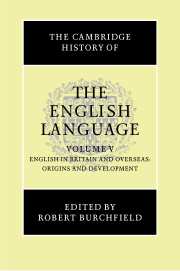Book contents
- Frontmatter
- 1 Introduction
- PART I Regional varieties of English in Great Britain and Ireland
- PART II English overseas
- Glossary of linguistic terms
- Bibliography
- Index
- THE CAMBRIDGE HISTORY OF THE ENGLISH LANGUAGE
- Map 7.1 Movements of English/Creole speakers in the seventeenth century
- Map 7.2 Movements of English/Creole speakers after 1700
- References
1 - Introduction
Published online by Cambridge University Press: 28 March 2008
- Frontmatter
- 1 Introduction
- PART I Regional varieties of English in Great Britain and Ireland
- PART II English overseas
- Glossary of linguistic terms
- Bibliography
- Index
- THE CAMBRIDGE HISTORY OF THE ENGLISH LANGUAGE
- Map 7.1 Movements of English/Creole speakers in the seventeenth century
- Map 7.2 Movements of English/Creole speakers after 1700
- References
Summary
Variety and diversity
Varieties of English: some introductory remarks
The essays in this volume give an account of the history and development of a number of distinct and highly diversified varieties of English – varieties that, in varying degrees, are recognisably different from one another and from standard British and standard American English. Most people would have little difficulty in identifying the English-speaking region in which the following sentences might be heard:
Ye'll be duin wi't afore I win hame, will ye no?
There's tall you are!
I'm after missing the bus (‘I have just missed the bus’)
The ooms and oupas of the platteland
without having to turn to the Scottish, Welsh, Irish and South African English chapters that follow. But few people could describe in any systematic way how the separate constituents of these sequences of words came to be emblematic of the varieties they represent.
It should be borne in mind that speakers of local forms of English are often unaware that others regard their speech as in any way unusual. Martyn Wakelin, in his book The Archaeology of English (1988), for example, cites a conversation between Lady Constance Chatterley and her husband's gamekeeper Mellors, who, although having been a lieutenant in the Indian Army, used ‘broad Derbyshire’ when it suited him:
‘'Appen yer'd better 'ave this key, an' Ah mun fend for t'bods some other road.’ (Perhaps you had better have this key, and I must make provision for the birds in some other way.)… way.)... She looked at him, getting his meaning through the fog of the dialect. 'Why don't you speak ordinary English?' she said coldly. 'Me! Ah thowt it wor ordinary.'
Information
- Type
- Chapter
- Information
- The Cambridge History of the English Language , pp. 01 - 20Publisher: Cambridge University PressPrint publication year: 1994
References
Accessibility standard: Unknown
Why this information is here
This section outlines the accessibility features of this content - including support for screen readers, full keyboard navigation and high-contrast display options. This may not be relevant for you.Accessibility Information
- 24
- Cited by
